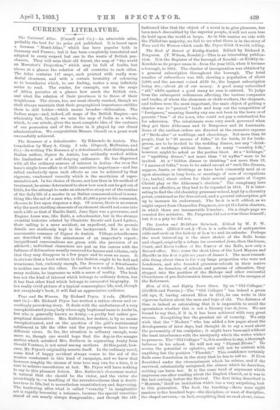The Book of Record of Kirkby - Kendal. Edited by Richard S.
Ferguson. (T. Wilson, Kendal.)—This is an interesting publica- tion. It is the Register of the borough of Kendal—or Kirkby-in- Kendal° as its proper name is—from the year 1575, when it became a borough, to 1685. The charter of incorporation was obtained by a general subscription throughout the borough. The total number of subscribers was 869, showing a population of about 2,000, and the amount raised £133 8s., the largest subscription being 40s.=about £4 of our money. A good many subscribed "nil," while against a good many no sum is entered. To judge from the subsequent ordinances affecting the various companies and trades, of whom the shearmen or cloth-workers, the chapmen, and tailors wore the most important, the main object of getting a charter was to " protect " trade and keep out the competition of "foreigners," meaning thereby any one not born in the town or of parents "free" of the town, who could not pay a substantial fee for admission, The inhabitants were very much governed when they got their Alderman and 12 Burgesses and 24 Assistants. Some of the earliest orders are directed at the excessive expense of " Bride-ales " or weddings, and churchings. Not more than 80 people, that is "20 messes of folks," 10 for bride, 10 for bride- groom, are to be invited to the wedding dinner, nor any " drink- lags " at weddings without license. As many "country folk," however, might be asked as the parties liked. At a " kirkinge," or " upeitting dinner," not more than "12 wyffes " were to be invited. At a "bidden dinner or drinking" not more than 12, "S messes of folks," were to be asked except at" such like dinners, suppers, feasts, or drinkings as have been commonly used at or upon shootings in long bows, or meetings of men of occupations [i.e., trades] about orders for their several pageants of Corpus Christi play or the Alderman's election." The sumptuary laws were not effective, as they had to be repealed in 1614. It is inter- esting to find the old chauntry grammar-school, kept by a chauntry priest, continued as the free-school, and a general subscription got up to increase its endowment. The book is well edited, as we might expect from Chancellor Ferguson, exc.-got the Latin charters, in which there are innumerable Eunder.3. On a single page we counted five mistakes. Mr. Ferguson did not revise these himself ; but it is a pity he did not.


































 Previous page
Previous page